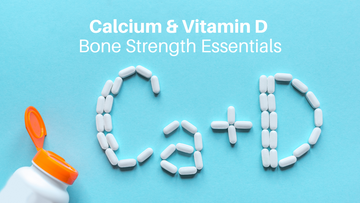Healthy bones are the foundation of a vibrant and active lifestyle, supporting everything from daily movements to physical activities. As we age, the need to maintain bone strength becomes even more crucial to avoid issues such as fractures and osteoporosis. Among the various nutrients that contribute to bone health, calcium and vitamin D stand out as the key players. This blog delves into the intricate relationship between these two essential nutrients, explaining how they work together to promote bone health, the significance of maintaining adequate calcium levels, and the diverse sources from which you can obtain them.
Also Read: Glow from Within: Best Vitamins for Skin
What Is Calcium?
Calcium is a vital mineral that plays several critical roles in the body. Approximately 99% of the body’s calcium is stored in the bones and teeth, forming the hard structure that supports and protects various organs. The remaining 1% circulates in the blood, where it aids in muscle contraction, nerve function, and blood clotting. This dual function of calcium—supporting both skeletal integrity and essential physiological processes—underscores its importance. As the body cannot produce calcium on its own, it is crucial to obtain adequate amounts through diet or supplements to maintain bone health and overall well-being.
Why Vitamin D is Equally Important
While calcium is the primary building block of bones, it requires vitamin D to be effectively absorbed and utilized by the body. Vitamin D, a fat-soluble vitamin, facilitates the absorption of calcium from the gut into the bloodstream, ensuring that this essential mineral reaches the bones where it is needed. Without sufficient vitamin D, even a calcium-rich diet may fall short in supporting bone health. Vitamin D can be synthesized in the skin when exposed to sunlight, which is why it is often referred to as the "sunshine vitamin." However, for those who have limited sun exposure, obtaining vitamin D from dietary sources or supplements becomes crucial for maintaining strong bones.
Also Read: The Vital Importance of Vitamins for Overall Well-Being
Calcium Levels Required for Bone Health
Maintaining appropriate calcium levels is essential throughout different life stages, as the body's demand for calcium varies with age, gender, and overall health. For infants and children, adequate calcium intake is critical for building strong bones as they grow. Adolescents require higher amounts of calcium to support the rapid bone development that occurs during puberty. For adults, sufficient calcium intake helps maintain bone density and prevent bone loss. Postmenopausal women and older adults, in particular, need to pay special attention to their calcium intake as they are at a higher risk of osteoporosis. Below are the general daily recommended calcium intake levels:
- Infants (0-6 months): 200 mg
- Infants (7-12 months): 260 mg
- Children (1-3 years): 700 mg
- Children (4-8 years): 1,000 mg
- Teens (9-18 years): 1,300 mg
- Adults (19-50 years): 1,000 mg
- Men (51-70 years): 1,000 mg
- Women (51-70 years): 1,200 mg
- Adults (71 years and older): 1,200 mg
These recommendations emphasize the importance of tailoring calcium intake according to the specific needs of each life stage to ensure ongoing bone health.
Role of Vitamin D in Calcium Absorption
The relationship between calcium and vitamin D is symbiotic; vitamin D is essential for the efficient absorption of calcium in the intestines. When vitamin D levels are adequate, the body can absorb about 30-40% of the calcium consumed, compared to only 10-15% when vitamin D is deficient. This absorbed calcium is then used for bone mineralization, which is the process of depositing calcium into the bone tissue, thereby making bones stronger and denser. The recommended daily intake of vitamin D ranges from 600 to 800 IU for most adults, but older adults, who are at a higher risk of bone loss and fractures, may require higher levels. Ensuring that you meet your vitamin D needs through sunlight, diet, or supplements is vital for optimizing calcium absorption and supporting bone health.
Also Read: Vitamins and Minerals Difference: Understanding Their Unique Roles in Health
Functions and Benefits of Calcium
Structural Integrity of Bones and Teeth: Calcium is indispensable for the formation and maintenance of a robust skeletal system. From infancy through adolescence, calcium contributes to the development of strong, dense bones, setting the stage for a healthy adulthood. In adults, calcium continues to play a critical role by helping to maintain bone density, which naturally decreases with age. Moreover, calcium is crucial for the repair and remodeling of bone tissue, a continuous process that keeps bones strong and resilient throughout life.
Muscle Function: Beyond its role in bone health, calcium is essential for muscle function. When a nerve stimulates a muscle, calcium ions are released from their storage sites within the muscle cells, triggering a contraction. After the contraction, calcium is pumped back into storage, allowing the muscle to relax. This cycle of contraction and relaxation, which is crucial for every movement the body makes, depends heavily on calcium availability.
Cardiovascular Health: Calcium also plays a vital role in the cardiovascular system. It is involved in the regulation of the heart muscle, helping to maintain a regular heartbeat. Additionally, calcium contributes to the function of blood vessels by enabling their contraction and relaxation, which is necessary for maintaining proper blood pressure and flow. Adequate calcium levels are thus essential for a healthy heart and circulatory system.
Nerve Transmission: Calcium ions are key players in the transmission of nerve signals. These signals, which are the basis of all neurological activities, including muscle coordination, sensory perception, and cognitive function, depend on calcium for their propagation. By facilitating the release of neurotransmitters, calcium helps maintain communication between nerve cells, ensuring the smooth functioning of the nervous system.
Sources of Calcium
Dietary Sources
Getting enough calcium from your diet is the most natural way to meet your daily needs. Some of the best dietary sources of calcium include:
- Dairy Products: Milk, cheese, and yogurt are well-known for their high calcium content and are widely consumed for bone health.
- Leafy Greens: Vegetables such as kale, broccoli, and turnip greens are excellent non-dairy sources of calcium, making them ideal for those who are lactose intolerant or prefer a plant-based diet.
- Fish: Sardines and salmon, especially those with bones, are rich in calcium and offer the added benefit of omega-3 fatty acids.
- Fortified Foods: Many foods, such as cereals, orange juice, and plant-based milk, are fortified with calcium, providing additional options for boosting calcium intake.
Supplementation: In cases where dietary intake falls short, calcium supplements can help fill the gap. Supplements are available in various forms, such as calcium carbonate and calcium citrate, each with different absorption rates. It is advisable to consult with a healthcare provider before starting any supplement to ensure it meets your individual needs and to avoid potential risks associated with excessive calcium intake.
Also Read: Discovering the Bountiful Plant-Based Diet Benefits: Health, Environment, and Beyond
Sources of Vitamin D
Sunlight: The most natural and effective way to obtain vitamin D is through exposure to sunlight. The skin synthesizes vitamin D when exposed to UVB rays from the sun, making outdoor activities a simple and enjoyable way to boost vitamin D levels. However, the amount of vitamin D produced depends on factors such as geographic location, skin type, age, and the use of sunscreen. Generally, spending about 15-30 minutes in the sun a few times a week is sufficient for most people, but those with limited sun exposure may need to rely more on dietary sources or supplements.
Dietary Sources: If sunlight exposure is inadequate, certain foods can help meet your vitamin D needs:
- Fatty Fish: Fish like salmon, tuna, and mackerel are among the richest natural sources of vitamin D.
- Liver: Beef liver provides a good amount of vitamin D, along with other nutrients like vitamin A and iron.
- Egg Yolks: Eggs, especially the yolks, contain some vitamin D, making them a versatile option for adding this nutrient to your diet.
- Fortified Foods: Many dairy products, orange juice, soy milk, and cereals are fortified with vitamin D, offering additional sources to help meet daily requirements.
Supplementation
Vitamin D supplements are widely available and can be particularly beneficial for individuals with limited sun exposure or those who do not consume enough vitamin D-rich foods. These supplements come in two forms: vitamin D2 (ergocalciferol) and vitamin D3 (cholecalciferol), with D3 being the more effective at raising blood levels of vitamin D. As with calcium supplements, it’s essential to consult with a healthcare provider to determine the optimal dosage and ensure that supplementation is both safe and effective.
Conclusion: Fortifying Your Bones with Calcium and Vitamin D
In conclusion, calcium and vitamin D are essential nutrients that work hand in hand to support bone health throughout life. By ensuring adequate intake of both, you can significantly reduce the risk of bone-related disorders, such as osteoporosis, and maintain a strong skeletal foundation. Whether through a well-balanced diet, regular sun exposure, or supplementation, incorporating these nutrients into your daily routine is a proactive step towards long-term bone health. Taking charge of your bone health today will pay dividends in the future, allowing you to lead an active and healthy life well into your later years.











